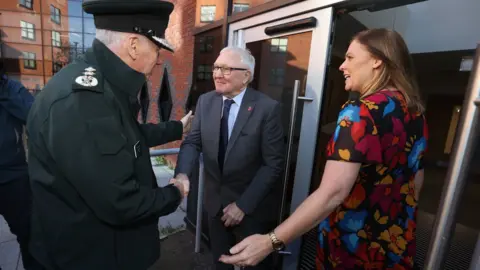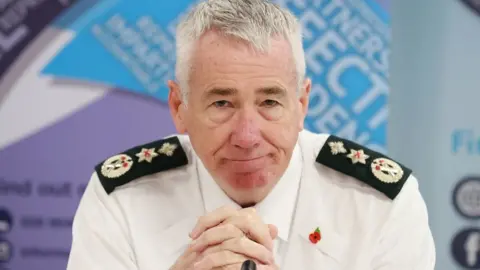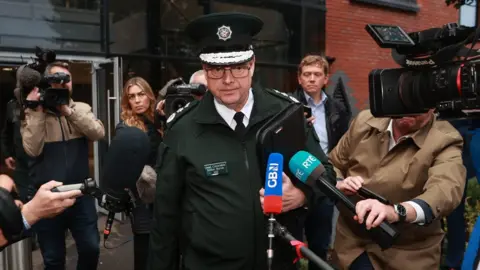PSNI chief constable Jon Boutcher wants for fresh policing money
 PA/Liam McBurney
PA/Liam McBurneyThe new chief constable of the Police Service of Northern Ireland (PSNI) has said he hopes Northern Ireland's executive will return and more funding will be released to the force.
Jon Boutcher, who had been interim PSNI chief constable, was speaking after his appointment.
He said the PSNI would be ready "at the front of the queue" for funding.
Northern Ireland has been without an executive due to a DUP boycott over post-Brexit trading arrangements.
"We have a £52m gap we need to address and I will be lobbying at every level to make sure PSNI gets the funding it deserves," he said.
He said that because policing in Northern Ireland "cannot fail", it must be funded in a way that will "keep people safe".
He paid tribute to his new colleagues in the force as "outstanding".
 PA Media
PA Media"Everyone in Northern Ireland should be very proud of the police service that we have," he said
"Even now as we are sitting here they are dealing with complexity and difficulties that we cant begin to imagine."
He said a number of "recent challenges" had distracted attention away from the PSNI's work.
"It's my job to get the focus back on the delivery of that work. The workforce has my absolute support," he said.
 PA Media
PA MediaMr Boutcher said there were officers and staff who feel sometimes they "operate in fear of getting things wrong and the unfair consequences of doing that".
With the huge workload of the PSNI, he said there would be times when "we get things wrong" and that lessons would be learned from those occasions.
He said he would listen to any politician with concerns but that "independence (in policing) was sacrosanct".
Mr Boutcher also said that sick leave levels among the force have gone "up and up and up" and that fixing that is a priority.
Vice chairman of the Policing Board, Edgar Jardine, said Mr Boutcher's appointment was the result of a "rigorous selection process".
"This has been a challenging time," he said.
Mr Jardine also said that assurances had been given that there would be no conflict between Mr Boutcher's new role and his previous job overseeing Operation Kenova.
The operation is an independent investigation into the activities of the Army's top spy within the IRA during the Troubles in Northern Ireland, which the new chief constable has led for the past five years.
His Operation Kenova report into the agent, who was known as Stakeknife, is due to be published in the coming months.
Mr Jardine said that, as part of the approval of Mr Boutcher's appointment by the secretary of state, the board had to provide assurance around "mitigations to ensure there as no conflict of interest between his former role in Operation Kenova and his new role as chief constable".
"Clearly this is an important safeguard," he added.
Mr Boutcher said he would not "walk away" from victims' families who were involved in Operation Kenova and said their response to his new appointment had been "huge".
How did Jon Boutcher come to lead the PSNI?
The former head of Bedforshire Police replaces previous chief constable Simon Byrne, who resigned in September after a series of crises under his leadership.
He quit after a series of controversies, including a court ruling that two junior officers were unlawfully disciplined and a number of data breaches within the force.
Mr Boutcher's appointment was made by the Policing Board and approved by Northern Ireland Secretary Chris Heaton-Harris.
He had previously applied to lead the Metropolitan Police after the resignation of Cressida Dick last year but he was unsuccessful in that process.
He was also unsuccessful in his bid to become PSNI chief constable in 2019, when the job eventually went to Mr Byrne.
He was one of two candidates shortlisted for the role, alongside Bobby Singleton, an assistant chief constable with the PSNI.
The position carries a salary of £220,000 and is considered one of the most demanding jobs in UK policing.
The PSNI has a staff of more than 9,000 and a budget of about £800m.
Mr Boutcher's contract is for five years but it can be extended thereafter.
The interview panel consisted of Ms Toner and independent Policing Board member Mukesh Sharma as well as board members Joanne Bunting of the DUP, Gerry Kelly of Sinn Féin and Alliance Party representative Nuala McAllister.

Who is Jon Boutcher?
- Mr Boutcher (58) is a long-serving police officer who has held senior positions in several UK forces.
- His policing career spans more than 30 years.
- His most senior role to date was chief constable of Bedfordshire Police, a post he held from 2015 to 2019.
- Before that he spent 28 years in London's Metropolitan Police, mostly as a detective.
- Within the Met, he served with its Flying Squad, infiltrating organised crime, and then in 2003 he was transferred to the Anti-Terrorism Branch.
- In 2005, he was the lead detective in the investigation into the 7 July bombings which killed 52 people on London's transport system.
- Two weeks later he led the manhunt for the 21/7 bombers which resulted in the arrests of those who plotted the failed attack.
- Since 2016 he has led Operation Kenova - an independent investigation into the activities of the IRA spy codenamed Stakeknife.
- One of his specialist areas is undercover policing and he served as the UK's national policing lead for technical surveillance units.
- He studied criminology at Cambridge University, gaining a master's degree in the subject.

